These illustrations reveal the human stories of the world’s most dangerous migration route
The IRC collaborated with illustrator Paul Blow to depict the journeys of people making it along the Central Mediterranean Route.
The IRC collaborated with illustrator Paul Blow to depict the journeys of people making it along the Central Mediterranean Route.
The Central Mediterranean Route runs from the Sahel region in Africa through the deserts of Niger, to conflict-ridden Libya and across the Mediterranean sea to Italy.
It is dangerous at every step. Tightening border control over recent years has not deterred people from seeking safety and a better life, but only pushes them into the hands of smugglers, traffickers and further harm.
What drives people onto these journeys, despite the dangers? What are the risks that lie ahead? How does it feel to leave your family behind?
We listened to people along the route - Mali, Niger, Libya and Italy - to hear about the dangers they face, their hopes for the future and how they keep going in the face of it all.
Illustrator Paul Blow depicted their stories.
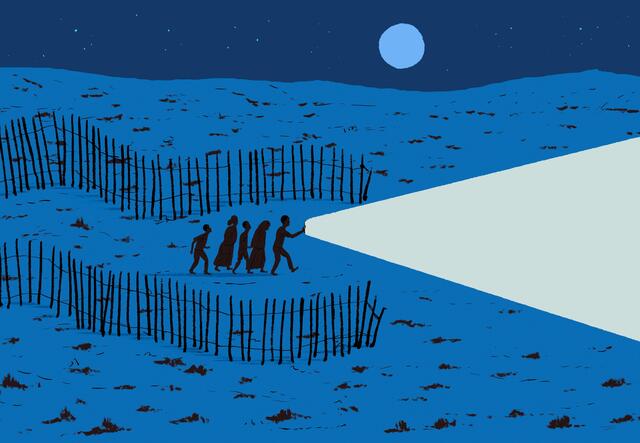
Every person on the route has different reasons for why they left their countries, but a common thread that ties them together is enduring hope. Hope for a life free from danger and violence, hope to escape poverty, or hope that their children can have a better future. Hope is the guiding light that keeps people moving on despite the barriers they face.
Another similarity between many of the people making these journeys is their determination to help their families back home.
“I think about my children and my siblings' children and they are without education. [Where I’m from] in Chad, children are attending to sheeps and cows, they’ve lost their education. I thought I'd go away to find the means to educate my children. The work here allows me to cover expenses so they can study. If I stayed in Chad, I wouldn’t be able to do that,” 40-year-old Hassan*, who came from Chad to Libya to find work, explains his reason for leaving.
As 27-year-old Obioma, a mother-of-two who left Nigeria to come to Niger, explains: “When people see you on the street they call you [a] ‘stranger’. They say: ‘you should go back to your country.’ But you just need to ignore them because you have a goal, you know why you are here. I work hard to have money and to support my family. As a mother of two children, it’s not easy, life is very hard. That's what's pushed me to travel, I need to take care of my family.”
Flora, who is also 27, speaks with a similar conviction. She left her home of Cameroon and is now living in Niger, but she plans to go to Algeria, Morocco and then Europe. “I left with a goal, I am determined to have a better life. If I go back to my home country, it will be like I didn’t achieve my goal. It will be a waste of time. The only thing I want to do is to work. I want to have a good life.”
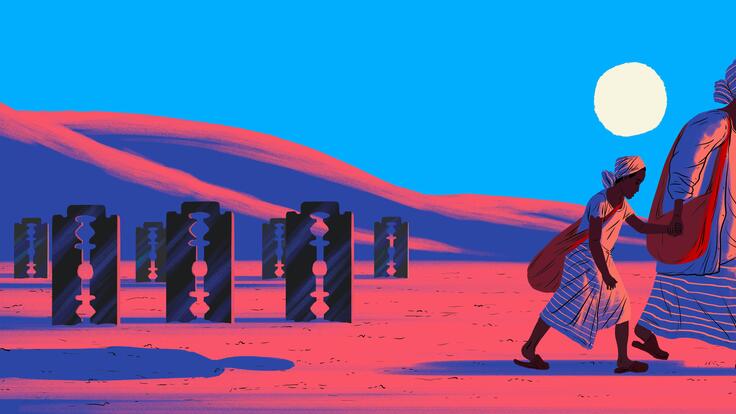
Fleeing abuse and domestic violence is often part of the reason why women embark on this dangerous journey. Alia was training to be a vet when she decided to leave Sudan. “I escaped with my daughter because her father wanted to perform genital mutilation on her. She was 11 years old. He’s a drug addict. Ever since I left Sudan he’s been threatening to kill me and my daughter.”
Libya has not brought them the sanctuary they need. Alia has been threatened by a Libyan man who said he would kidnap her daughter, now 14, if she did not allow him to marry her. Her husband has tried to track her down and even came to the farm where she was living and working. “The guard [at the farm] said that several men came and asked about me there, thank God he told them there were no Sudanese people living there.”
Alia is now receiving psychological support in Libya. But she wants to move on. She’s now planning to make the crossing to Italy. “After Italy, I want to find a route to Canada, then I could finish my studies and start practicing as a vet.”
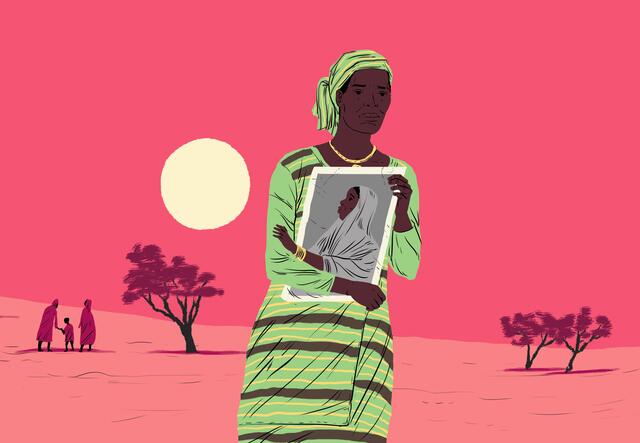
People often make the journeys on their own and the route can be incredibly isolating. Flora describes the mental toll it took on her. “The loneliness was very hard. I was alone, I wish I had someone to talk to and make a plan during the journey.”
People who have fled their homes treasure photos of their families and cling onto the memories of their loved ones. Obioma says that the most important thing she’s brought with her is the photograph of her children. “What I’m missing the most is my children. When I miss them, I look at the picture.”
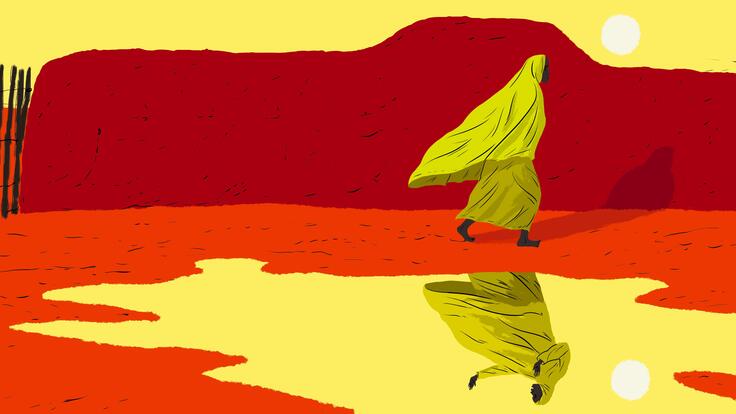
On the route, women and girls are exposed to enormous risk of sexual abuse and exploitation. Reports indicate that nearly all women and adolescent girls who have taken the Central Mediterranean Route and made it to Libya, have survived sexual violence.
27-year-old Marie, from Cameroon, was raped and attacked on her journey to Niger. “I was raped and I saw many rapes. But I had a goal in mind, I wanted to reach it. So, I decided to move on and not to look backward or to think about what happened. We were robbed. We thought we were sleeping in a safe place, but we weren’t safe at all. That’s all I can say.”
Flora says: “I can say that as a woman or a girl you are really exposed to violence. You are never safe. It is very dangerous.”
Women are also at risk of exploitation, trafficking and prostitution. 40-year-old Grace from Togo was propositioned in Niger. “I met women who were sex workers. They had to do it, they didn’t have a choice. They advised me to do it too, even just for 2 or 6 months. They said I could earn a lot of money and go back to my country. But I said no. I couldn’t do it.”
Many women and girls on the move report they have been raped and attacked by the smugglers they’ve paid to bring them to safety. Jidda, a Nigerian man who made it to Italy after going through the Central Mediterranean Route, explains what he witnessed in Libya: “They [the smugglers] don’t care if the women are pregnant. Many of the women got pregnant and they don't know who is responsible, they don’t even care if you are young or not, old or not, they sleep with you. The driver said that the girl should be giving him oral sex. You understand what I’m saying? It’s terrible, it’s terrible.”
The Libyan legislation commonly denies medical assistance to single pregnant women unless they are accompanied by a man or have a marriage certificate. In some cases, this can be fatal. The IRC and the DRC on the ground are, among other activities, providing prenatal and postnatal care to protect expectant mothers.
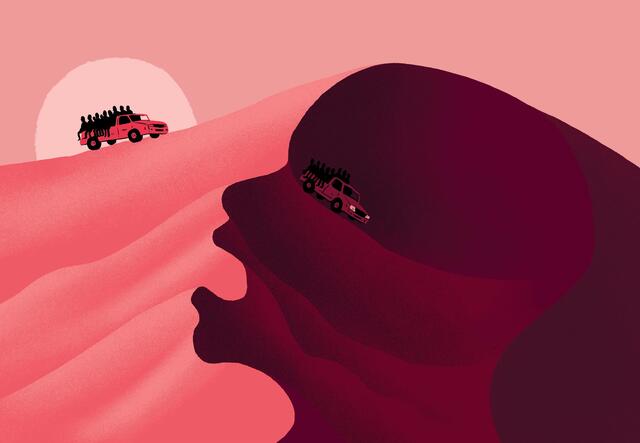
To get to Libya, people must first cross the Sahara. Men, women and children are piled onto the back of pick-up trucks and told to hold on with the risk of falling off and being left in the desert alone.
Jidda describes the journey. “It’s a very organised system, before you are coming down from the bus, another one is already there waiting for you, because it is illegal [to cross without the right documentation] , they don’t want the police or immigration officers to know about it. It’s hurry, hurry, hurry. We’re in these open trucks with sticks between our legs. You had to hold that stick very firm. Some fell and they died and the driver just kept moving. There’s no water. The sun is crushing. The breeze that comes is as hot as fire.
“You hear people crying, wailing. Days, nights, they kept driving. They mistreat you, you don’t have a voice. You see people fainting. They started crying because they are thirsty. I remember vividly I revived three people with water.”
In the desert, there are checkpoints where guards and militia rob and demand money from everyone. Victor, a Nigerian man who also took the journey and is now in Italy, explains: “There were lots of checkpoints, they collected all the money we had, they beat us severely. When we had no money, in some cases, they would take some of the ladies among us, rape them. We saw a lot of atrocities.”
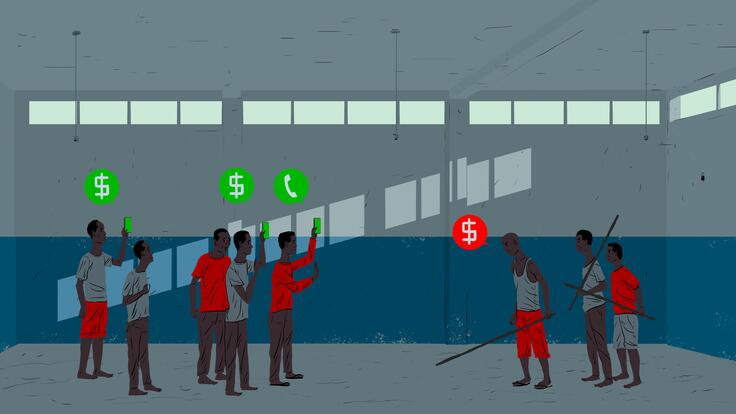
In Libya, detention and smuggling operations, often run by armed groups, arbitrarily detain and beat people unless they can find money for their release. It’s common for migrants and refugees to be threatened and told to call their parents back home to send money.
Jidda managed to escape detention in Libya, but remembers what it was like: “They searched you, searched everywhere thoroughly, and if they felt like you were lying, they have sticks there, they will beat you, collect your phones, anything that is valuable, they collect it from you. I heard people were kidnapped and they would be beating them and put them on the phone to call their parents, so when their parents heard, their children would be crying, they would start sending money, so many cases like that. I believe most parents [would] have not heard from their children in a very long time, not knowing if they are dead already.”
Victor has a similar story. “Those people that are held captive, they [smugglers] usually beat them twice a day because they say they did not pay the money they were supposed to pay. Some of them were sold as slaves, some of them did not have money to proceed so they kept them there. There were 400 [people] kept in one place. We spent four days there. We saw a lot of atrocities. On the second day they shot and killed one Nigerian boy. Some of the Libyans would come at night, drunk, take some of the ladies there and rape them.”
Alia was also blackmailed on her journey. “Some group took the whole car with everyone inside. I don’t know what that place was. There, they took all our things. They told us that we have to call our families so they would pay a ransom for us. I told them even if you kill us now no one would pay a ransom, no one knew that we had left, not even the closest people to us, not even my two sisters knew.”

Many people who are making the journey along the Central Mediterranean Route are in search of work, but when they find jobs they are often exploited.
Alia is working as a cleaner in Libya, but says there have been multiple occasions when she did not get paid for her work. “I would go and clean, sometimes working for two or three days, they ask me to move refrigerators to clean under them, move this and that, and at the end they don’t pay me my money. They say enough, just go away, there’s no money!
“I’m actually lucky because I can speak Arabic and I can talk to them. Others can't speak any Arabic, their situations are worse. There is this guy from Chad, he works very early in the morning, I wake up at 7am and I find him working, until the evening, 10 or 11pm, planting things. He spends the whole day working non-stop, even the clothes he wears, he never changes them. Well, if only they gave him the pay that he deserved, but no, he is being mistreated, he is a human being at the end of the day.”
23-year-old Fatu from Sierra Leone has found similar problems working in Libya. “I finished the month working and they did not pay me my money. I can’t fight them, you know? It is their country.”
COVID-19 has made things even tougher for refugees and migrants trying to find work as lockdown has closed off job opportunities and forced people inside with no savings or ways to earn money. Read more about the ways the coronavirus is affecting people on the route.
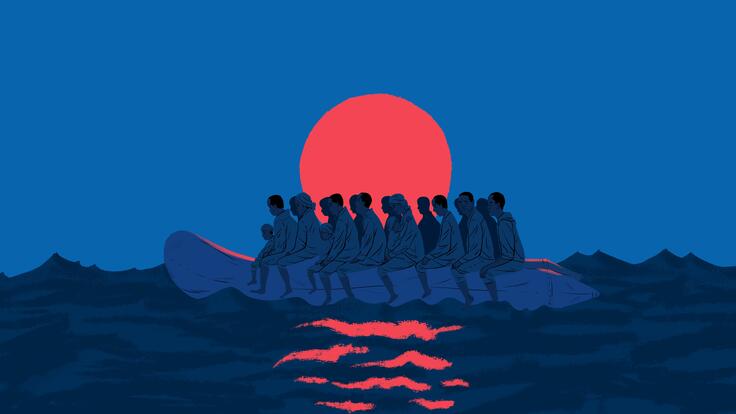
Often, people set out with the intention of ending their journeys in Libya but the conditions and exploitation they endure propel them to continue their journeys to Europe. Italy and Malta are closest to Libya - but in order to get there, people must cross the terrifying Mediterranean sea at night.
Many do not make it across - 988 people have drowned since January 2019. Others are intercepted by Libyan coastguards, also supported by the European Union, who return them to Libya’s shores. This year, almost 5,475 people were brought back to Libya while most of them ended up in the unofficial detention centres without the ability to access any support.
27-year-old Sudanese Asim describes what happened to him in April 2019 when he attempted to cross the sea: “We came close to Malta and were met by a ship, we thought they were going to receive us, six or seven men jumped in the water to swim towards the ship. Those men all drowned, we never saw them again. For four days we just sat there in our boat and no one gave us water or anything, people who were on the boat with me died from thirst.”
Eventually, Asim was returned to Libya, but once back on land, he was taken to prison. He was the only person out of everyone that made the journey that has managed to get out of prison and is now planning to return to Sudan.
Jidda also made the journey. “It is a huge risk - a matter of life and death. But when you get into a situation where you are left with no choice, what do you do? There were 120 people in the boat, women, children, guys. I don’t even swim. We were sent out at 4am, the guys were sitting on the edge, one leg in the sea and one in the boat.
“Front and back, it was all water, if somebody was struggling you just had to ask them to be calm. We were there for 7 hours. We’re going and going and then suddenly we saw an airplane, those little planes that accommodate just one person, flew around, we hoped that they saw us.”
Jidda and everyone on board was eventually rescued and taken to shore in Italy.
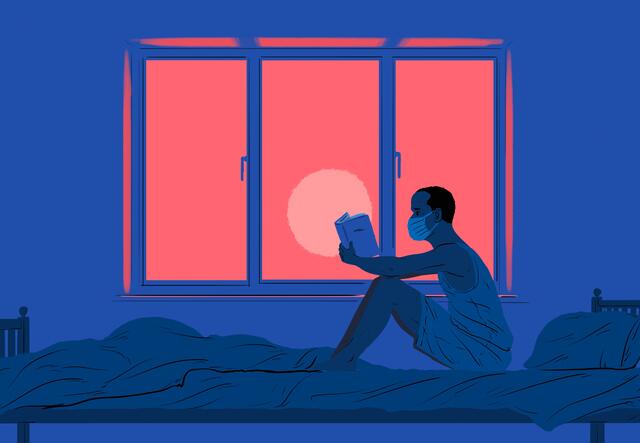
Life has continued to be challenging for Jidda as he’s struggled to find regular work without having yet received asylum. The pandemic has made things even worse as opportunities have dried up due to the lockdown. Where employment is available, like on farms, people are expected to continue to work without any protection measures against the virus.
Victor also made it to Italy, where he got a job selling school books, but since the lockdown, he’s been out of work. He’s felt bored and lonely inside and has been keeping himself busy with his one passion: reading. He believes the lockdown is nothing compared to the journey he’s been on to reach Italy. “I’m very lucky to be alive, I lost a lot of friends, some in Libya, some in the desert, some in the Mediterranean sea. Because of what we’ve experienced this lockdown is small fry, it’s a minute compared to the life changing experiences we’ve had.”
*All names in this article have been changed for protection.
Along the route, the IRC, Danish Refugee Council (DRC), the Mixed Migration Centre (MMC) and Start Network have formed The Mediterranean Mixed Migration Consortium to help people on the move. In Libya, our work ranges from helping people to recover from trauma with a dedicated team of psychologists, to providing shelters for migrants without homes. In Niger, our social workers provide legal aid and enable people to call home for free. We're also providing cash to vulnerable people, particularly women, which enables people to buy food and other essentials with dignity and choice. In Italy, the IRC operates Refugee.Info, an online platform that answers questions from refugees and migrants who have arrived in the country. The service helps people navigate their new surroundings and understand the asylum process. Whilst, the DRC started operating mobile units to reach vulnerable people living in the street who have lost access to food, health assistance and shelter during the COVID-19 pandemic.
The MMC is a knowledge centre offering independent and high-quality data, research, analysis and expertise on mixed migration. The information from MMC is invaluable in providing rapid analysis of the context on the route. Start Network provide an emergency fund to respond to new and unforeseen needs on the route, which has helped more than 45,000 people since August 2018.
The Mediterranean Mixed Migration Consortium is funded by DFID to assist refugees and migrants across West and North Africa.